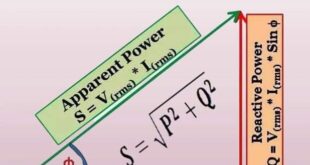Electrical Power – Its Types and Units Introduction Electrical power is a fundamental concept that plays a pivotal role in modern society. From lighting our homes to powering vast industries, electrical power has become an indispensable part of our daily lives. In this article, we will explore what electrical power …
Read More »Tag Archives: current
Multimeter Types and Their Applications
Multimeter Types and Their Applications Introduction Multimeters are indispensable tools used in various fields that involve electrical measurements. They play a vital role in diagnosing electrical problems, troubleshooting circuits, and ensuring accurate measurements of voltage, current, resistance, and other electrical parameters. Understanding the different types of multimeters and their applications …
Read More »Basic Concepts and Definitions of Electronics
Understanding Basic Concepts and Definitions of Electronics Introduction Electrical and electronics engineering is a fascinating field that powers the technology-driven world we live in. In this introductory chapter, we will explore some fundamental concepts that serve as the building blocks for understanding and working with electricity and electronics. Understanding these …
Read More »What Is The Lowest Voltage That People Can Die At?
Answer: The lowest voltage that can potentially be lethal to humans is around 50 volts. However, the danger also depends on factors like current, resistance, and the path the electricity takes through the body. Reasoning: Threshold for Sensation: Voltages below 50 volts are often considered safe, as they may not …
Read More »Does voltage or current cause heat?
Answer: Current causes heat. When current flows through a resistive material, it encounters resistance, leading to the generation of heat according to Joule’s Law (P = I²R). Reasoning: Voltage represents the force that drives current, and resistance impedes the flow of current. When current encounters resistance (R), it experiences a …
Read More »Which is more powerful voltage or current?
Answer: Voltage and current are different aspects of electrical systems. Neither is inherently more powerful than the other; their significance depends on the context and application. Reasoning: Voltage and current are fundamental electrical quantities. Voltage (measured in volts) is the potential energy per unit charge, while current (measured in amperes) …
Read More »Why current is better than voltage?
Answer: Current is not inherently “better” than voltage; they are different aspects of electrical systems. Current and voltage are interdependent, and their relationship is defined by Ohm’s Law (V=IR). However, the choice between emphasizing current or voltage depends on the specific application and requirements of the electrical system. Reasoning: The …
Read More »What matters more current or voltage?
Answer: Both current and voltage are important in electrical systems, but their significance depends on the context. In general, neither matters more than the other; they are interrelated through Ohm’s Law (V = I * R). The importance of current or voltage depends on the specific application and the characteristics …
Read More »Which One is the Fatal, Voltage or Current and Why?
Answer: Current is usually more fatal than voltage. The severity of an electric shock depends on the amount of current passing through the body, with higher currents being more dangerous. Voltage, on the other hand, determines the potential for current flow. Reasoning: While voltage represents the force or pressure pushing …
Read More »Are volts stronger than watts?
Answer: No, volts are not stronger than watts. Volts and watts are different units of measurement for electricity. Volts measure electrical potential, while watts measure power, which is the rate at which energy is used or produced. Reasoning: Volts and watts are distinct concepts in electricity. Volts represent the force …
Read More » Electrical Engineering World Wiring a Brighter Tomorrow!
Electrical Engineering World Wiring a Brighter Tomorrow!









